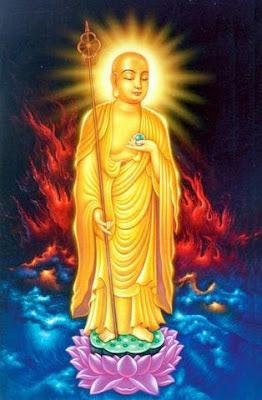Saturday, February 28, 2009
Thursday, February 26, 2009
Wednesday, February 25, 2009
Tuesday, February 24, 2009
Sunday, February 22, 2009
Thursday, February 19, 2009
 Every-Minute Zen
Every-Minute ZenZen students are with their masters at least ten years before they presume to teach others. Nan-in was visited by Tenno, who, having passed his apprenticeship, had become a teacher. The day happened to be rainy, so Tenno wore wooden clogs and carried an umbrella. After greeting him Nan-in remarked: "I suppose you left your wodden clogs in the vestibule. I want to know if your umbrella is on the right or left side of the clogs."
Tenno, confused, had no instant answer. He realized that he was unable to carry his Zen every minute. He became Nan-in's pupil, and he studied six more years to accomplish his every-minute Zen.
Wednesday, February 18, 2009
Monday, February 16, 2009
 If You Love, Love Openly
If You Love, Love OpenlyTwenty monks and one nun, who was named Eshun, were practicing meditation with a certain Zen master.
Eshun was very pretty even though her head was shaved and her dress plain. Several monks secretly fell in love with her. One of them wrote her a love letter, insisting upon a private meeting.
Eshun did not reply. The following day the master gave a lecture to the group, and when it was over, Eshun arose. Addressing the one who had written to her, she said: "If you really love me so much, come and embrace me now."
Sunday, February 15, 2009
Thursday, February 12, 2009
Wednesday, February 11, 2009
Tuesday, February 10, 2009
\

Ennui has made more gamblers than avarice, more drunkards than thirst, and perhaps as many suicides as despair. Buddha
Monday, February 09, 2009
Sunday, February 08, 2009
 Three Days More
Three Days MoreSuiwo, the disciple of Hakuin, was a good teacher. During one summer seclusion period, a pupil came to him from a southern island of Japan.
Suiwo gave him the problem: "Hear the sound of one hand."
The pupil remained three years but could not pass this test. One night he came in tears to Suiwo. "I must return south in shame and embarrassment," he said, "for I cannot solve my problem."
"Wait one week more and meditate constantly," advised Suiwo. Still no enlightenment came to the pupil. "Try for another week," said Suiwo. The pupil obeyed, but in vain.
"Still another week." Yet this was of no avail. In despair the student begged to be released, but Suiwo requested another meditation of five days. They were without result. Then he said: "Meditate for three days longer, then if you fail to attain enlightenment, you had better kill yourself."
On the second day the pupil was enlightened.
Friday, February 06, 2009
 No Loving-Kindness
No Loving-KindnessThere was an old woman in China who had supported a monk for over twenty years. She had built a little hut for him and fed him while he was meditating. Finally she wondered just what progress he had made in all this time.
To find out, she obtained the help of a girl rich in desire. "Go and embrace him," she told her, "and then ask him suddenly: 'What now?'"
The girl called upon the monk and without much ado caressed him, asking him what he was going to do about it.
"An old tree grows on a cold rock in winter," replied the monk somewhat poetically. "Nowhere is there any warmth."
The girl returned and related what he had said.
"To think I fed that fellow for twenty years!" exclaimed the old woman in anger. "He showed no consideration for your needs, no disposition to explain your condition. He need not have responded to passion, but at least he should have evidenced some compassion."
She at once went to the hut of the monk and burned it down.
Thursday, February 05, 2009
 How Grass & Trees Become Enlightened
How Grass & Trees Become EnlightenedDuring the Kamakura period, Shinkan studied Tendai six years and then studied Zen seven years; then he went to China and contemplated Zen for thirteen years more.
When he returned to Japan many desired to interview him and asked onscure questions. But when Shinkan received visitors, which was infrequently, he seldom answered their questions. One day a fifty-year-old student of enlightenment said to Shinkan: "I have studied the Tendai school of thought since I was a little boy, but one thing in it I cannot understand. Tendai claims that even the grass and trees will become enlightened. To me this eems very strange."
"Of what use is it to discuss how grass and trees become enlightened?" asked Shinkan. "The question is how you yourself can become so. Did you ever consider that?"
"I never thought of it in that way," marveled the old man.
"Then go home and think it over," finished Shinkan.
Wednesday, February 04, 2009
Subscribe to:
Posts (Atom)











